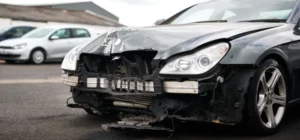Car accidents can occur in various scenarios, each with its unique dynamics and contributing factors. In the aftermath of a collision, an experienced car accident lawyer may help you understanding who is at fault is crucial for insurance claims and potential legal actions.
Rear-End Collisions
One of the most common types of car accidents is the rear-end collision. These accidents typically occur when one vehicle collides with the rear of the vehicle in front of it. In most cases, the driver who rear-ends another vehicle is considered at fault. This is based on the principle that drivers should maintain a safe following distance and be prepared to stop in case the vehicle in front comes to a sudden halt.
However, there are instances where the driver in the front vehicle may share some responsibility. For example, if the front driver suddenly and unexpectedly slams on the brakes without any valid reason, they may contribute to the collision. It’s essential to consult an experienced accident lawyer to determine fault in rear-end collision scenarios accurately.
Left-Turn Accidents
Left-turn accidents occur when a vehicle making a left turn collides with another vehicle coming from the opposite direction or overtaking it. In most cases, the driver making the left turn is considered at fault, as they are required to yield to oncoming traffic. However, exceptions may apply if the other driver was speeding or ran a red light, causing the collision.
Intersection Accidents
Intersections are high-risk areas for accidents, with drivers often misunderstanding right-of-way rules or attempting to beat traffic signals. Determining fault in intersection accidents depends on factors such as traffic signals, signs, and right-of-way rules. If a driver fails to yield the right of way or disobeys traffic signals, they may be held responsible for the collision. Consulting an experienced injury attorney can help navigate the complexities of intersection accident cases.
Head-On Collisions
Head-on collisions occur when two vehicles traveling in opposite directions crash into each other. Fault in these accidents is generally determined by assessing which driver crossed into the opposing lane. If one driver veered into the wrong lane due to distracted driving, impaired driving, or falling asleep at the wheel, they would likely be held responsible for the collision.
Multi-Vehicle Pileups
Multi-vehicle pileups involve three or more vehicles and often occur in adverse weather conditions or due to sudden stops on highways. Determining fault in such complex scenarios can be challenging. Typically, drivers who fail to maintain a safe following distance or fail to react appropriately to changing road conditions share some responsibility for the pileup. Insurance companies and legal experts may analyze evidence to allocate fault proportionally among the drivers involved.
Side-Impact Collisions
Side-impact collisions, also known as T-bone collisions, occur when the front end of one vehicle strikes the side of another vehicle. Determining fault in these accidents often involves investigating factors such as right-of-way violations, speeding, and traffic signal compliance. The driver who fails to yield the right of way or disregards traffic signals may be held responsible for the collision.
Single-Vehicle Accidents
In some cases, car accidents involve only one vehicle, such as hitting a stationary object or losing control and crashing into a ditch. Determining fault in single-vehicle accidents can be more nuanced. Factors such as road conditions, weather, and mechanical failures may contribute. In some instances, road hazards or poorly maintained roads could lead to liability on the part of local authorities.
Need Legal Help? Contact A Car Accident Attorney Today
If you’ve been involved in a car accident, seeking legal guidance from the Law Offices of Samuel Fishman can provide you with expert advice and support. Don’t navigate the aftermath of an accident alone – reach out to professionals who specialize in car accident cases to ensure your rights are protected and your best interests are served.

